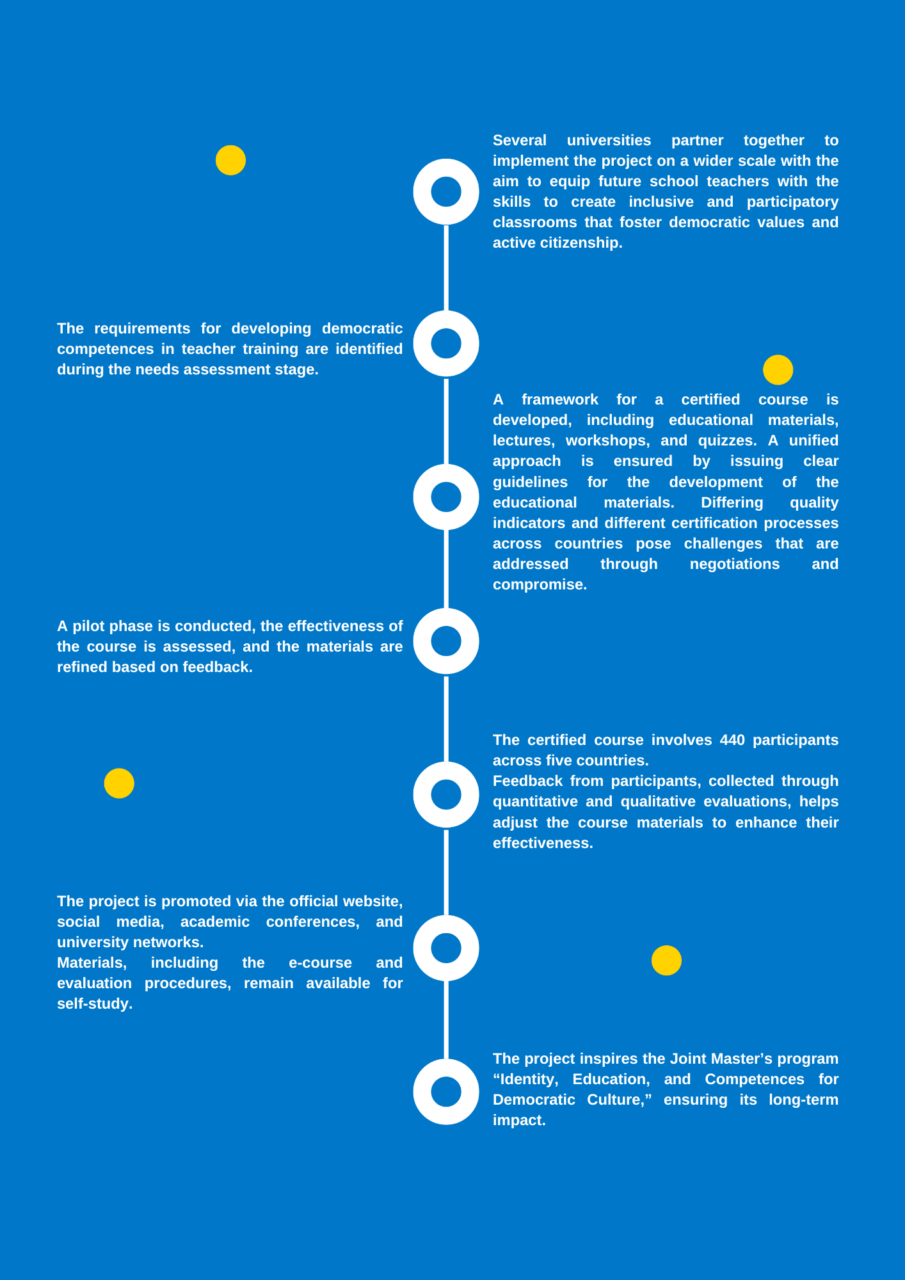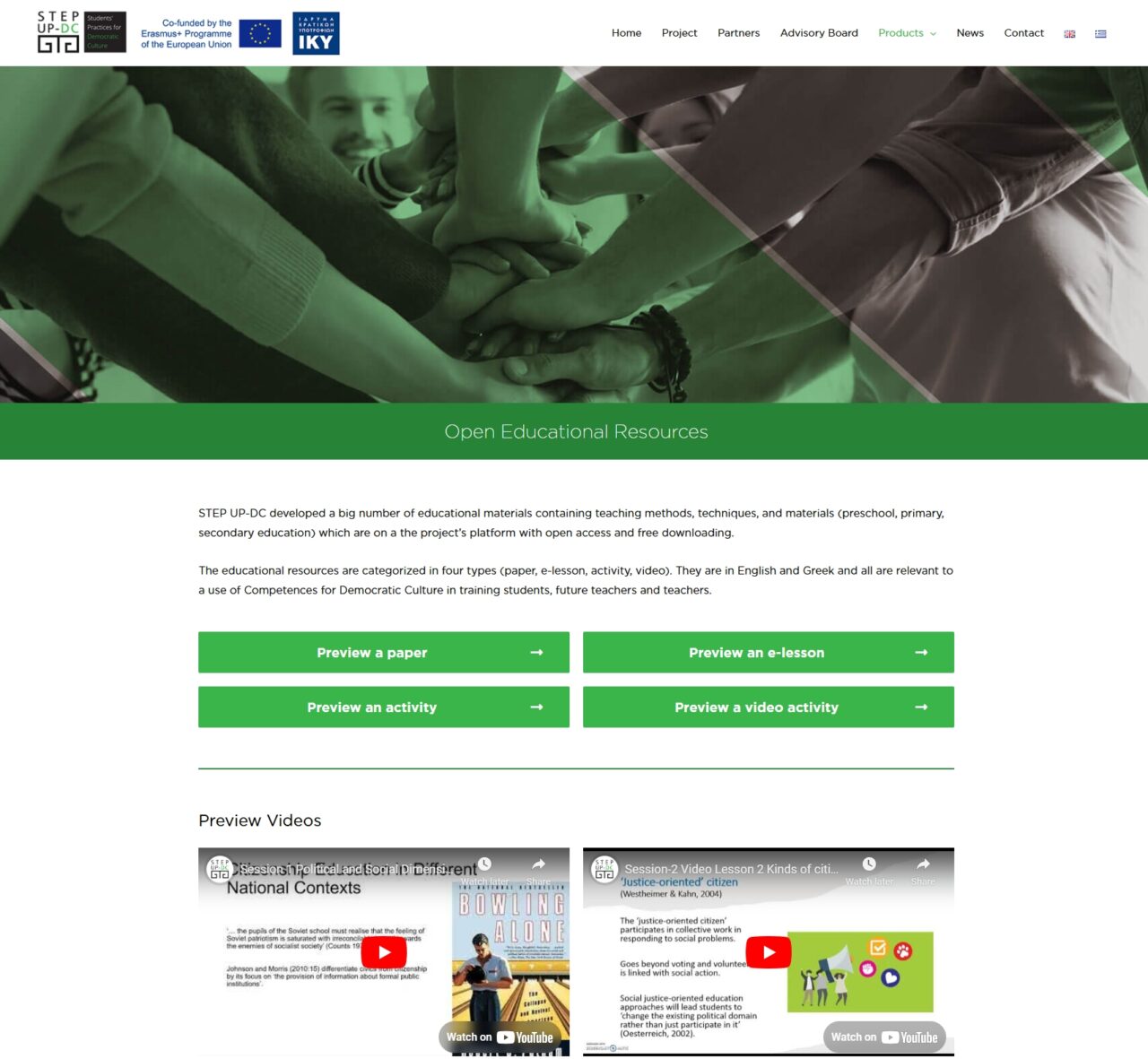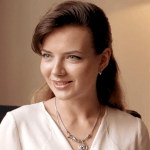The project succeeded in creating awareness on democratic values, inclusion and cohesion of society. Mobilised and trained for this purpose some of the most important and productive pillars of society, the educators and students of all levels, emphasising that the democratic conscience of citizens is no longer self-evident and given. The project provided evidence that it is necessary to introduce special courses by suitably qualified and certified teachers on the crucial topic of democratic culture.
Student Teachers’ Practices for Democratic Culture (STEP UP-DC) is a project that addresses today’s need for active citizenship and practical democratic culture. Four universities and organisations from Greece, Cyprus, the UK, Norway, and Denmark collaborated to develop a comprehensive course that equips future school teachers with the knowledge to create inclusive, participatory classrooms, promoting a democratic mind-set in the next generation, supporting a lasting impact on schools and communities.
Today, there are so many needs for active citizenship and practical democratic culture that I think it seems inevitable that school education should be involved in the development of children’s abilities to live and think democratically.
We discussed the STEP UP-DC project with its author, Marios Koukounaras Liagkis, to better understand its structure, challenges, and impact.
What was the process of coming up with the STEP UP-DC project? How did the idea of a course for teaching Competences for Democratic Culture appear?
I have been working as a specialist trainer with the European Wergeland Centre (EWC) for many years, and I deal specifically with the application of the Reference Framework of Competences for Democratic Culture (RFCDC) in education. I am also responsible for the internship of students in schools at the National Kapodistrian University of Athens (NKUA). So the idea came naturally – we should include the development of the competences for democratic culture in the training of future preschool, primary, and secondary school teachers.
How did you break the organisation of this project into stages, and what were these?
The programme had clear stages from the very beginning. The first stage was the needs assessment. Based on the results, we proceeded to the second stage, which was the development of the course and the creation of the educational materials. The third stage involved a pilot application, its evaluation, and the development of a certification process. Finally, the last stage was the dissemination of the project.
The project included 4 universities and 440 participants. What people did you need on your team, and how did you get them all to join and work together on a single goal?
The NKUA and the EWC formed the initial core. It was especially helpful that the NKUA is the largest university in Greece, with vast experience in organising different programmes. I then invited the University of Thessaly to join because I knew the professor there, and he, in turn, introduced me to his colleagues from the University of Nicosia, the Leeds Beckett University, and a colleague from Denmark. We then had colleagues in different departments of these universities acting as trainers and developers of educational materials, and PhD candidates acted as researchers and admins. The online system for learning materials, tools, and tests was also developed in-house, mostly by the IT specialists from the NKUA. Overall, I can say that we relied on our personal networks.
The course has a lot of learning materials, lectures, workshops, quizzes, etc. If all of these were created by different departments of several universities, how did you unify it into a single course?
The project management team decided on the framework of the course and issued guidelines for its design, the sessions, and the development of the materials. All the authors followed these guidelines, which proved very useful.
What were the difficulties of sharing the workload between several organisations?
I have to admit that it was difficult because we hadn’t collaborated at this level before and often had different approaches to things. For example, everyone had a different understanding of project quality indicators and evaluation of the pilot application.
The certification process posed another challenge, as each country follows a different framework, which was particularly noticeable between the Greek and British approaches. We had to conduct extensive studies, discuss academic hours, and compromise to create a method that met the needs of education processes in different countries.
It took several meetings and rounds of negotiation to find solutions to all these challenges, but thankfully, the coordination team had strong organisational, problem-solving, and negotiation skills.
How did you promote the project?
We used the networks of each university department, as well as the project’s website and social media.
Did you have any feedback from the participants?
From the very beginning, we had internal evaluations carried out by the partner organisation AGORA. They provided continuous monitoring of the project’s impact, along with quantitative and qualitative evaluations of the course and training materials. The feedback from both the students and the teachers helped us make necessary adjustments and changes.
What were the results of this project?
The seminar was certified by the NKUA’s Lifelong Education Centre, ensuring that participants received the certification with ECTS recognised by European universities.
The e-course is still available for self-study, and anyone can complete it as an asynchronous online training. The evaluation procedure is also available, though both are currently available without certification.
What do you consider to be the biggest overall impact of this project?
I think the biggest overall impact is the establishment of the Joint Master’s programme Identity, Education and Competences for Democratic Culture, which is currently organised by the NKUA and the EWC. This programme is built upon the educational platform and the idea of the STEP UP-DC, and is, in no small part, based on the feedback that came from both students and teachers during this project.
What would you recommend to someone who wishes to start a similar project?
Work with partners who approach problem-solving in a way that complements your own. Ideally, all partners should begin working together from the application stage to identify potential differences early, avoiding future difficulties. Carefully evaluate all of the project’s stages, especially those you present in the application, in terms of their working hours. Don’t declare more than what is needed or what can be done. This filtering must be rigorous before the application is submitted. Finally, you should be passionate and patient from the beginning until the end.
Project Roadmap

Project outcomes
The primary outcome of the STEP UP-DC project is a certified course designed to train future educators in fostering inclusive and democratic classroom practices.

Website
The STEP UP-DC website provides educators with access to open educational resources, course materials, training modules, and certification tools, ensuring quality and consistency in teaching democratic values.
About the project
Supported by:
Erasmus+
EU Youth Programme Priority:
Participation in Democratic Life
Topic:
Youth Participation / Promoting Participation for All
Visibility:
The STEP UP-DC project maintained an online presence through its official website, Facebook page, and network partnerships. The project’s certified course and educational resources were promoted at partner university events, conferences, and disseminated through academic and professional networks across Europe.
Organisations involved:












